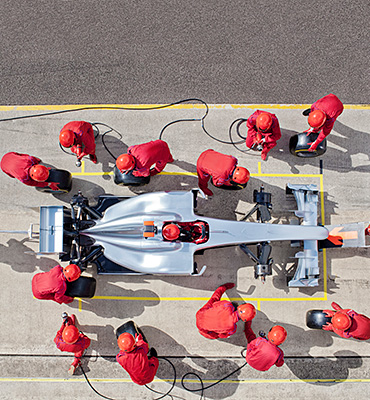Keeping De Beers’ most remote mines and plants connected
Connecting remote locations to make mining safer for the world's largest diamond producer.
- Company
- De Beers
- Employés
- 10,000 to 50,000
- Localisation
- Mondial
- Industry
- Natural resources and utilities

Overview
How do you keep some of the most remote working locations in the world connected? That’s the question James Ross of De Beers answers every day. He’s tasked with keeping the mining company’s 28 locations linked up, to keep workers safe and in contact with their friends and families.
But James’ challenges don’t stop there. He also needs to make sure every connection is strong and robust enough to handle huge amounts of vital business data. And it all has to stay secure. At all times. That’s where we come in.
The challenge
De Beers delivers over a third of the world’s diamonds. And with no signs of demand slowing down, they need the right technology to keep their operations safe, secure and well connected. Even as they move further afield. Tom Ormsby, Head of Corporate Affairs in Canada, explains: “We already mine in the Arctic, under the ocean, and on land. As existing resources dwindle, we’ll explore ever more remote territories.”
Employees in the company’s northern Canada mines work fortnightly shifts on and off in a sub-Arctic wilderness. They fly in and fly out, while heavy equipment and stores travel on ice roads for the few weeks of the year that’s possible.
With more than 20,000 employees in 28 locations around the world, many like those in Canada, the entire business relies on sharing information and delay-free decision-making.
When our people are hundreds of kilometres from regular comms infrastructures, they need ways to contact family and access corporate systems.”
The solution
When De Beers was acquired by Anglo American, it moved over to a shared BT IP Connect Global managed network. This connects all 28 De Beers locations and means employees at Canada’s most remote mines can talk to their families on FaceTime or Skype. Satellite or microwave links provide access to the backbone for the short hop to our Internet Connect Global.
That speedy and resilient wide area network (WAN) is perfect for long-distance collaboration. Today, everyone in the company uses our MeetMe and Cisco WebEx for audio and web conferences. With a video connection to back them, they can remotely advise mine workers on how to repair faulty equipment, for example. De Beer’s HR team in Canada have also started using WebEx to pre-screen job candidates remotely before inviting them to attend interviews.
Executives can use Cisco TelePresence immersive video conferencing suites at five operational hubs in Africa, Canada, and the UK to hold meetings without travelling. “It takes the better part of two calendar days to travel from North America to southern Africa by plane, and often one can’t afford to give up that time,” Tom Says.
Everyone, from accounts to exploration teams, is more productive. It’s common for people to attend two or three conferences a day. “TelePresence sharpens decision-making by giving executives a sustainable alternative to time consuming long-distance travel,” adds Tom.
Across the global WAN, our Connect Intelligence optimises bandwidth, avoiding things like repetitive transfers of large email attachments, for example. Meanwhile, our IP Connect Global network automatically prioritises time sensitive traffic, like voice, video and critical application data.
BT has been a longstanding partner of De Beers. It’s one of the only global vendors with the reach to support us in the regions in which we operate."
The result
The next step is to integrate the De Beers and Anglo American voice platforms, which both run on Cisco technology. Then, all voice traffic will move to the global WAN, removing the cost of international calls and making it even easier for the whole business to work together.
“The whole company will have a single dial plan so we can make voice or video calls desk-to-desk anywhere in the world,” says James. “Instead of sending emails, that will help create a common culture.” Cisco Unified Communications Manager servers in the cloud will also pave the way for features like presence and instant messaging.
As well as voice and video traffic, the global WAN carries huge volumes of financial, environmental, and geospatial data from business applications, CCTV systems, and radar data collection points.
With cyber-attacks on the increase, De Beers closely guards commercial and personal information and its intellectual property. “BT and Cisco play a major role in our cyber-security in the sense that they’ve helped us build our networks with an eye to possible threats,” says James.
And the story doesn’t end there. As De Beers pushes the boundaries with automation, it needs technology to evolve at the same pace. James concludes: “What we envision in our partnership with BT is to enable the mines to operate more effectively, with lower costs, and without having to put human lives at risk.”




